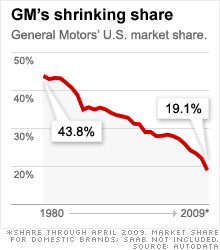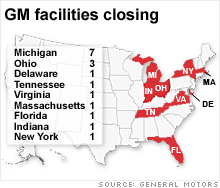Why the market doesn't care about GM
GM finally filed for bankruptcy and stocks soared. Even though its woes could add to unemployment, some think economic damage will be minimal.



NEW YORK (CNNMoney.com) -- It finally happened. General Motors has filed for bankruptcy. And like most other bits of bad news that have taken place in the past few weeks, investors didn't even blink.
The Dow, S&P 500 and Nasdaq all surged more than 2.5% Monday afternoon following the news of the GM (GM, Fortune 500) bankruptcy.
Shares of Cisco Systems (CSCO, Fortune 500), which will be replacing GM in the Dow as of next week, were up 6.5%. And Ford Motor (F, Fortune 500), the only member of Detroit's Big Three that hasn't filed for bankruptcy this year, shot up 6%.
While GM's bankruptcy has been expected for some time, should investors really dismiss the company's Chapter 11 filing with such a cavalier attitude? After all, GM is going to close a dozen facilities as a result of the bankruptcy and also shut down a large chunk of its dealership network.
That's likely to lead to tens of thousands of job losses at the very least. And in case you haven't noticed, the unemployment rate is already at 8.9%, a 26-year high.
Still, some economists and market experts think that the impact of GM's bankruptcy is already factored into stocks and consumer's expectations about the economy.
James Glassman, senior economist with JPMorgan Chase, said that even if the GM bankruptcy leads to a large number of job losses, it would probably pale in comparison to the upheaval that took place in the labor markets from 2000 through 2003.
Nearly 3 million manufacturing jobs were lost in that period due to outsourcing, rising imports and other factors. But the economy did rebound after the 2001 recession, and the unemployment rate eventually fell to a low of 4.4% by 2006.
"For those who worry that GM's bankruptcy can be disruptive to the economy, I can't think of any thing worse than the millions of factory jobs lost earlier this decade," Glassman said. "But the broad economy got back to nearly full employment. GM's bankruptcy is traumatic but it doesn't have to get in the way of a real recovery."
In addition, there were numerous other reports Monday for investors to focus on that suggested that the global economy is, in fact, starting to improve.
Talkback: What impact will GM's bankruptcy have on the broader economy and markets? Leave your comments at the bottom of this story.
For one, the government reported Monday morning that personal income unexpectedly rose in April while personal spending fell by a smaller-than-forecast amount.
What's more, readings about the manufacturing sector in the U.S., as well as the United Kingdom and China, released Monday also came in better-than-expected.
"Everybody knew the GM bankruptcy was a done deal. It was just a formality at this point," said Bill Stone, chief investment strategist for PNC Wealth Management in Philadelphia.
"Putting GM into context, there is more support for the global recovery. GM is in the rearview mirror. People are looking forward and across the globe, maybe we've seen the worst of the global downturn," Stone added.
In fact, some argue that since the decline of the U.S. auto industry has been a story that has unfolded over the past few decades, GM's bankruptcy is neither surprising nor too much of a cause for concern.
That may seem hard to believe for some, especially those living in the Midwest, where the ripple effects from the bankruptcy of both GM and Chrysler before it will be felt the most.
But John Canally, economist for LPL Financial, an independent broker-dealer based in Boston, pointed out that output from the auto industry is currently less than 2% of the nation's gross domestic product, the broadest measure of economic activity.
By way of comparison, he said that the auto sector's output has averaged 3.5% of GDP since 1970 and was, at one point during that period, as high as 5%.
"GM's bankruptcy, or Chrysler's for that matter, is not enough to detour the economy's road to recovery. The auto sector is just not a big enough contributor to the economy anymore," he said.
That's one reason why the people running the Dow Jones industrial average probably decided against adding Ford to replace GM.
And as strange as it may sound, some economists are viewing GM's bankruptcy as a good thing. Sure, Chapter 11 is further proof of the company's inability to keep costs under control and react to changing consumer tastes. But it could have been worse. It's not a Chapter 7 liquidation.
"This is better than the alternative of outright failure. This is failure with a clause," said Diane Swonk, chief economist with Mesirow Financial, a diversified financial services firm based in Chicago.
If the bankruptcy is done right, some argue, GM could emerge as a leaner, more efficient company that will eventually help boost economic growth again.
"I see more silver linings than dark clouds. Car sales are depressed and the crisis finally forced GM and the union to focus faster on shedding debt and cutting costs," said Glassman.
Swonk added that an orderly bankruptcy for GM should ensure that there are no massive disruptions to suppliers and other manufacturing companies that depend heavily on GM a Detroit's Big Three.
"What you didn't want was for the entire manufacturing sector with ties to autos to be at risk. This opens the door to keep some suppliers intact and opens the door for a new, more profitable GM down the road." she said. "There is still some hope for GM and the rest of Detroit."
Talkback: What impact will GM's bankruptcy have on the broader economy and markets? ![]()

